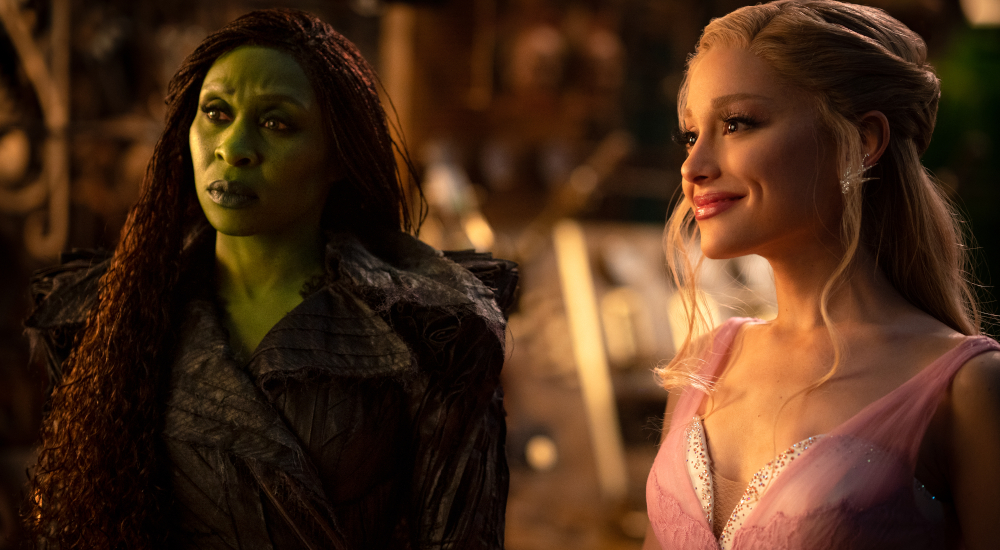"This is not the Oz I know."
For the most part, fans agree: the second act of Broadway's Wicked is far inferior to its first. The songs, characters, and storyline thrive during the initial segment, giving viewers life as they witness two boarding school roommates look past their differences and become unlikely best friends. Though the show is always great, the bar is set high, and intermission disrupts its pacing, leaving audiences with a story firmly tethered to the events of The Wizard of Oz, the 1939 Oscar-winning musical.
In New York, that intermission is twenty minutes. In cinemas, it's been a year.
Even knowing this, there is a mountain of anticipation for Jon M. Chu's Wicked: For Good. And rightfully so. The original film was a cultural phenomenon, scoring a pair of Oscars and catapulting the story even further into the mainstream conscience. But even with the wealth of riches surrounding him, Chu is unable to alter fate, succumbing to the same struggles the stage production faces, resulting in a film that is good and fine, but most definitely not the goodliest (trademark pending).
The film picks up after a never-confirmed time jump. Cynthia Erivo's Elphaba is a fugitive in hiding as laborers work to construct the highly recognized yellow brick road, ensuring that all lanes lead to Oz. Ariana Grande's Glinda has risen through the ranks, serving as a beacon of hope and goodwill as the community rallies against its fear and hatred of the Wicked Witch of the West.
Chu beautifully captures the moment, crafting a visual odyssey that reintroduces audiences to Oz. Darker than the original, the film embraces its color palette as the camera zooms over fields of tulips, a stark contrast to the newly minted home where Elphaba evades those hunting for her whereabouts. But even as familiar songs ring through our ears, there is a distinct tonal difference to For Good.
While the original film focused on light, uplifting splendors full of ambitiously choreographed dance sequences, For Good dives deep into its characters' complex moral dilemmas. Wicked has always been Elphaba's story. Her arc is centric. But Grande steps up her game, delivering an early-career-defining performance as she employs the silence, allowing viewers to journey with her as she analyzes Glinda's priorities. Even as stillness surrounds her, a hint of sorrow and frustration slips through her forced smile. She's lost without her best friend. And she doesn't see a way out from under the Wizard's manipulative thumb.
Broadway elitist will roll their eyes at Chu's decision to include two new songs. Though many will see it as Schwartz attempting to secure his fourth Oscar, Glinda's "The Girl in the Bubble" is a true-to-form track that adds depth and maturity to its performer. The scene plays perfectly within the film's context, giving it purpose, as if it's been part of the story all along. The same isn't true for Elphaba's "No Place Like Home." That one comes and goes without much notice—a rare unsatisfying tune within a film where every melody feels intentional.
When a sudden weather change sends Dorothy's house flying through the air and the blue plaid dress begins to skip down the golden-brick road, For Good reaches its apex. As each of our two best friends grows frustrated with the other's perspective, and a wand battle of sorts ensues, one can't help but laugh at the absurdity of it all. Yes, the entire narrative is pure fantasy, but there are important, relevant themes that intertwine with the story's central message. And though the occasional moments of absurdity are fun, they break the authentic, heartfelt showcase of friendship and the power of change.
As we become acquainted with Dorthy's infamous sidekicks and catch a quick glimpse of Toto, we remember that Wicked is both Elphaba and Glinda's story. And as they power through the titular track, hitting hair-raising harmonies with subtle perfection, you are reminded of the power that rests within a lyric and melody.
For Good is hardly perfect. And it is not as good as its predecessor. But that was a tall ask. And truthfully, it doesn't need to be. Though they are a continuation of a singular story, they are independent films. And though the performances prove the best asset, Chu has worked to craft a complete cinematic experience. More complex and inner-looking, For Good is less musically driven. But it still serves as a solid companion piece that fans should accept and enjoy.

